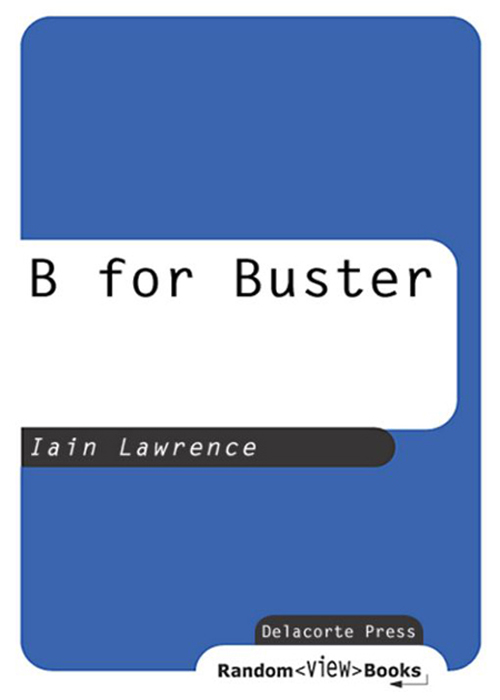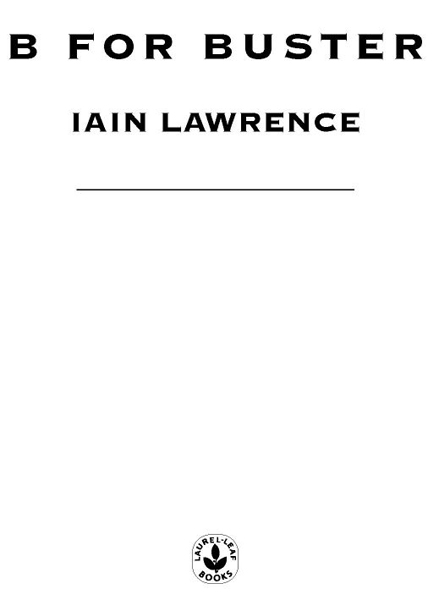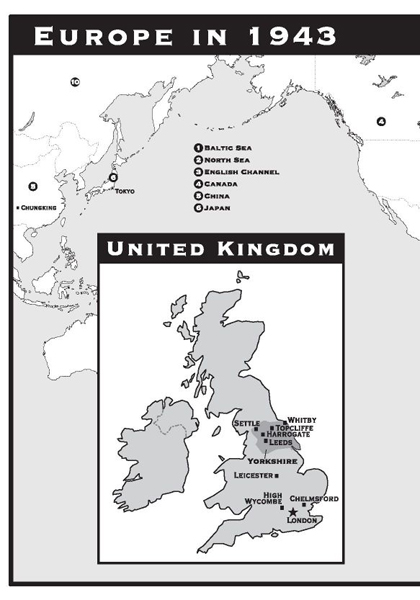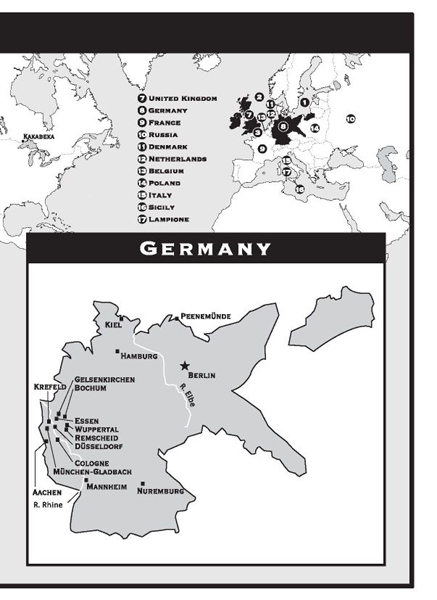B for Buster



Table of Contents
For Alysoun, my terrific fire-walking, board-busting sister


CHAPTER 1
I LEFT A TOWN where fewer than a thousand people lived. I traveled half the world, in the middle of a war, to get away from there. By the spring of 1943, when I finally arrived at a lonely airfield among the hills of Yorkshire, it seemed I had gone as far from Kakabeka as the moon was from the earth. But the first thing I saw when I walked through the door of the sergeants' mess was a guy I knew from home.
He was standing beside the piano, and I saw him only from the back, but I knew right away it was Donny Lee. No one else had hair as red as that, or ears as wide as those. No one but Donny looked so much like a clown from the back.
I thought of running away, but there was nowhere to go. I wanted to hide, but I couldn't. Lofty and Ratty and Buzz had come in behind me, filling the door of the Nissen hut. I just stood with my duffel bag in my hand as Donny turned toward me.
Just then, for a moment, I thought that it wasn't him after all, that it was someone older by many years. His face was a man's, with wrinkles and lines and dark blotches below his eyes. He couldn't be the boy I had seen just two years before, grinning as he climbed on an eastbound train. But his head started back in surprise and his mouth opened wide, and it was Donny, all right. He shouted across the crowd of airmen, “Hey! It's the kid from Kakabeka.”
“Donny!” I said. I dropped my bag and pushed away from Lofty and the others. The tin hut was full of smoke and noise, of laughter and a dreadful singing. I pushed my way through groups of fliers, desperate to reach the piano, to get to Donny before he blurted out my secret.
He kept shouting in a voice that was too loud, as though he had gone deaf as well as old. “It is!” he cried. “It's the Kid. It's the Kakabeka Kid!”
He had never called me that at home, and I wished he would stop it now. He was too much older and wilder than me, and we'd never really been friends. But now he threw his arms around my shoulders and hugged me like a brother. He turned me round and introduced me to his crew.
In all of England only Donny knew the truth about me, and I was sure he'd tell the others. But all he said was that we'd gone to the same crummy school in the same little town. He said that he had been my hero, which wasn't exactly true. Then he steered me behind the bar and backed me into the corner made by the storage room.
“Hey, Donny,” I said. “How many ops have you got?”
He didn't even answer. He pinned my shoulders to the wall and asked me, “What are you
doing
here?”
“What do you think?” I said.
“You stupid kid.” He thrust his face near mine, and his voice was angry. “You're only sixteen.”
If he had said it any louder,
everyone
would have learned the truth right there on my first day. But all the sergeants were busy with their bottles and their glasses, not even looking at me anymore. Lofty and little Ratty, still in the doorway, were gawking round the hut like tourists at a zoo, while Buzz just looked as half-witted as ever.
Donny lowered his voice, but didn't back away. His breath smelled of beer; his eyes seemed strange. “Go home,” he said. “Tell them you lied and you want to go home.”
“You're nuts,” I told him.
“Do it.” He pushed me again, so hard that the wall rattled. “Now. Before it's too late.”
He grabbed my sleeve and twisted it round my arm. He stared at the blue patch where a fist held a sheaf of lightning bolts, then down at the cloud-shaped badge of a warrant officer. “Man, oh man,” he said. “You must have told some beautiful lies.”
He was right; I'd told some good ones. I'd invented years of school and made myself an orphan. The only real things in my life anymore were the patch and the badge, and I was proud as a peacock to have them. I yanked the cloth from his fingers.
“Does your old man know you're here?” asked Donny.
“I doubt he knows I've
gone,
” I said. “It's only been eight months.” I tried to make a joke of it. “But just wait till he sobers up, eh?”
Donny stared at me so intently that I looked away, down at his tunic and tie. I saw a pair of wings on his chest, and my single one didn't seem so grand anymore. I envied Donny; I had wanted so much to be a pilot.
“I should tell them,” he said. “I should go to the CO right now andâ”
“No! Donny, don't.” I raised my voice too high, and it broke into an embarrassing squeak. Faces turned toward us; conversations stopped. Over by the door, Lofty frowned at Buzz, then started walking toward me. I put my hand on Donny's arm and begged him, “Please don't tell. Nobody knows the truth.”
He looked suddenly sad, and I saw how really deep his wrinkles were. He had aged like a dog, seven years for each of the two since I'd seen him. Just thenâhalf angry, half sadâhe looked a lot like my old man.
“What's wrong with you?” I asked.
“You'll get the chop,” he said.
“I won't.”
“You will. It's always the sprogs who buy the farm.”
“Well, not me. Not
us.
” I tipped my head toward the door. “Lofty's the best there is. And anywayâ”
“All right, Kid.” He straightened up; he took his hands away. “Come and see me when you change your mind.”
“You won't tell?” I asked.
“No. You're on your own.”
“Then swear,” I told him. “Swear to God.”
He shook his head. “You'll fly an op or two, then beg me to get you out.”
“Just do it,” I said. “Swear.”
And he did. I made him cross his heart and spit on his hand. Then he waved me off, with the same flick of his fingers that would have chased the deerflies back at home. “You'd better totter along and see Uncle Joe.”
“Who's that?” I asked.
“The CO. He likes to meet all the sprogs.”
Air force words were like music to me, but that one I hated. It made me blush, even though it was true; I
was
a sprog, a greenhorn.
Donny turned his back and disappeared into the swirl of blue just as Lofty came out of it. He was the tallest bloke I'd ever known, and I really felt like a kid as I looked way up at his face. Because of his height, and because he was almost twenty, I had always thought of him as an adult. But now, compared to Donny and the sergeants in the mess, he looked a bit silly, like an actor in a school play, only
trying
to look older.
“That chap,” he said. “I say, was he binding you, old boy?” Lofty was Canadian too. He had been in England no longer than me, in the air force just a month or two more. But he talked like an old hand, trotting out the airmen's slang whenever he could, and he sometimes mumbled through his nose, trying to sound more British than the Brits. “What was that he called you? Kaka what?”
“Beka,” I said with a sigh. “Kakabeka, okay?”
He had never heard of the place. I had told him and everyone else that my hometown was Port Arthur. He laughed and said, “I'll just call you Kid.”
Everybody did, from that day on. My real name was forgotten, and I became the Kid or Kak or Kakky. But sometimes I was Kaka, and then I cursed that Donny Lee.
Lofty and I, and Ratty and Buzz, stood by ourselves in a corner. We listened to bits of conversation and snatches of song, and it was like hearing echoes from our training unit. All that fliers talked about were searchlights and flak and who had bought the farm. We nudged each other and pointed at the battered old sofas and the battered piano, a baby grand. It was missing one key and one leg, and it was propped up at its narrow end by a paperback book and a bomb. I wasn't an expert on pianos, but I thought it was a twenty-pounder bomb. I was glad when an adjutant whisked us off to meet the commanding officer.
He took us down a cinder path to the buildings that were grouped below the control tower. Waiting there for us, sitting side by side on the steps, were Simon and Will, the only officers in our crew. Both lieutenants, they'd been housed in the separate officers' quarters at the other side of the airfield, an enormous buildingâa manor or somethingâthat I imagined was swank as could be. But I smiled to see their bicyles, a pair of old crates no better than the ones we'd left behind at the old squadron. They were parked in the usual heap by the path, a pile of rusted metal and bent spokes.
The adjutant slipped into the building and right back out. He sent us inside. “First door on your left.”
Right away I liked Uncle Joe. He wore his Irvin jacket of leather and fleece, and his flying cap, both so scruffy that he looked like a puppet that had been stuffed too long in its box. He didn't get up from the chair behind his desk, and when we saluted he scowled. “Stop that nonsense,” he said. “Sit down like proper people.”
His furniture might have come from the mess. The legs of his wooden chairs were splinted together, as though the medics had been practicing on them. His little sofa oozed bits of white stuffing. Wedged in its corner, picking bits of fluff, sat an old guy, quite thin, all bent up like a big insect. Uncle Joe pointed at him. “Here's your flight engineer,” he said. “Been waiting for a crew.”
There was a lot of nodding all around. Ratty nipped up and shook the fellow's hand. “Pleased to meet ya, Pop,” he said.
I felt sorry for the old guy. A pained expression came to his face, and I imagined that he didn't think of himself as very old, though he must have been at least thirty-five. It seemed he had just gotten his new name, and he didn't look any happier with it than I had been with mine.
The CO talked for an hour, telling us all about his squadron, the Four-Forty-Two. “Not the best,” he said. “Not the worst. Just another lot in the Canadian Group.” He went through everything in the same fashion, telling us the best and the worst of all his machines and pilots and men. Then he looked through a stack of paper and gave us
B for Buster,
an old Halifax Mk1 that was right down there with the worst. “It's an old crate, but it's got the gubbins,” he said. “Prove yourselves and you'll get a top-notch job. I don't let the sprogs prang my best buses.” I grinned like an idiot at his magical language.
He leaned back, his hands behind his head. “Now tell me about yourselves.”
It didn't take long. Six of us had met only three weeks earlier, at an operational training unit on the coast. We had stooged over London for a couple of nights, to get a taste of the searchlights, and we'd done a bit of gardening in the North Sea, sowing the mines that fliers called vegetables. But we hadn't even been shot at yet. Four of us were Canadian: Lofty had sold shoes in Vancouver. He wanted to be a bush pilot when he got back to civvy street, like Wop May after the Great War. Will had been studying law at the University of Toronto. He was a great poet, but he didn't tell that to the CO. Buzz, our mid-upper gunner, had hammered railway spikes in the Rockies, and we all thought of him as nearly equal to his hammer in the brains department. Ratty was American, with a past nearly as mysterious as mine. He had gone to Canada in 1941 to volunteer for the air force, but none of us ever learned how he'd spent more than a year in flying school. Everyone loved Ratty; he was small and strange and funny. Simon was Australian, with a booming voice and a tangle of gingery hair. He had told us once, in his normal shout, “I was a gadna down unda,” and I'd spent a week wondering if a “gadna” worked with kangaroos. It took me that long to figure out his accent and learn that he was really a gardener.
“And you?” asked the CO, nodding at me. I rattled off my usual lies about my poor dead parents and how I'd worked myself through high school. I nearly brought a tear to Uncle Joe with all my nonsense, and I saw sheer pity on the old guy's face. No one in the roomâscarcely anyone in the worldâknew that I had a drunken old logger for a dad, and a mother who cowered from him nearly every night but loved him in the mornings.
It was well after dark when we finished. All I wanted was to dash out and look at
B for Buster.
But Uncle Joe sent Will and Simon up to the officers' mess and called for an orderly to lead the rest of us to our Nissen huts. “Hop them round to the iron lung,” he said.
It was quite a hike, across the apron and over an empty pasture. In the distance we could see the Halifaxes, their black-painted bodies kind of swallowing the moonlight, but their cockpits and their turrets glowing silver and blue. They looked wonderful to me, like a flight of great birds come to rest for the night.
“Which one's
Buster
?” I asked. “Huh? Which one?”
The orderly kept walking. “Who cares?” he said. “They all look alike in the dark.”
I felt as small as a squashed bug. Then Pop grunted. “Cor,” he said. “You need spectacles, mate. Old
Buster
's the third from the left.” I thought,
I'm going to like the
old guy.
We were taken to a hut that looked just the same as all the others. The beds inside were arranged in two rows as straight as graves. Smack in the middle, like a monument in a churchyard, stood a hulking black coal stove. None of the beds had people in them, but it was easy to see which were vacant just by looking at the walls. There was a nearly solid display of pinup girls and snapshots. At the end of the hut was a picture of Kakabeka Falls, and I knew that Donny slept below it. But here and there, above beds, there were empty spaces where the walls were speckled only with pinholes. I chose the one closest to the door, flinging myself across it with a cry of “Mine!”
It was a dumb thing to do, for someone who was always trying to seem older. But I did a lot of things like that, to the amusement of Lofty and the others. They thought I was a bit wild, a bit stupid, maybe. Buzz's deep laugh brayed through the hut. Then Pop broke into a sprint and flung himself on the bed nearest the stove. “Mine!” he shouted, acting like a kid.